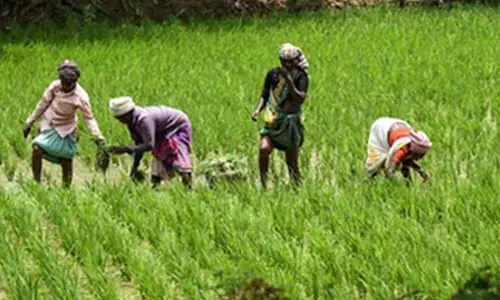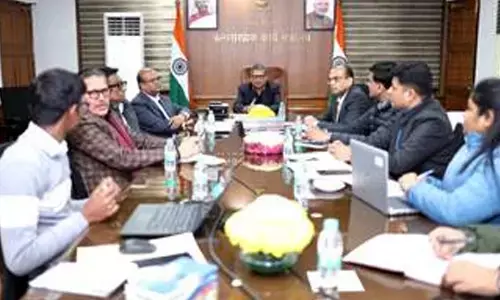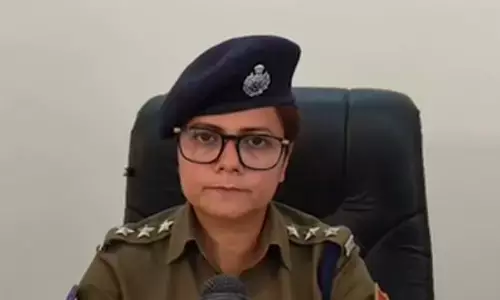Will the TSRTC be finally privatised?

20% discount on T24 tickets for visitors to Hyderabad National Book Fair
Is the Chief Minister K Chandrasekhar Rao selectively following the policy of Centre that Government has no business to be in business? Well, if what the new Chairman of the TSRTC Bajireddy Govardhan Reddy stated couple of days ago is any indication, there is a possibility that he may go down in the history of TSRTC as the last Chairman of the government- owned Telangana State Road Transport Corporation
Is the Chief Minister K Chandrasekhar Rao selectively following the policy of Centre that Government has no business to be in business? Well, if what the new Chairman of the TSRTC Bajireddy Govardhan Reddy stated couple of days ago is any indication, there is a possibility that he may go down in the history of TSRTC as the last Chairman of the government- owned Telangana State Road Transport Corporation.
The Corporation which has a grand history of being a loss making organisation for decades both during the undivided Andhra Pradesh and in the newly carved 29th state Telangana, certainly cannot make a 360 degree turn around and reach at least break even level.
Though KCR in 2014 used his favourite expression- "Sanasulu"- the previous regime could not make RTC profitable. The pink party supremo promised that TRS would achieve what his predecessors had failed to and assured that the corporation will not be privatised. 'We would never allow privatisation of the TSRTC. TSRTC is the 'wheel of development'. Railways are not very well connected in the State, and it is only TSRTC which connects every nook and corner of the State', he had thundered.
It seems that being in power for nearly seven years, he too seems to have come to the conclusion that the TSRTC continues to be an white elephant and it is difficult to resuscitate the Corporation which is plagued with many ills.
The gap between income and expenditure is increasing and has been adding to the losses in all the depots. The Corona had also struck a major blow and has put the Corporation on artificial respiratory system if not on ventilator.
Let's see what ails the Corporation? According to union leaders, officials of the Corporation are not accountable. No one takes the responsibility to assess the occupancy ratio route wise and make necessary changes in routes or timings of the buses. There has been no system to get real feedback and revise strategies accordingly.
TSRTC has about 50,000 employees but the Corporation has no Research and Development wing. No systematic efforts have been made to assess how to achieve fuel efficiency, how to see that the buses are maintained in good condition, what are the latest techniques available, how to upgrade the skills of employees at all levels or how to utilise the space in major bus stations for commercial purpose. Some may argue that TSRTC has been bagging fuel efficiency awards. But it proper systems were in place, it could save lot of money on fuel and thereby reduce the overall losses.
Though the private bus operators in big towns and tempos, jeeps etc in rural areas have been operating services illegally for several decades, no government either in the past or the present could control the menace and come with an effective system and make the corporation earn good revenue. Such private illegal transport services are thriving because there is no alternative official mode of transport in those areas.
While the private operators are allowed flexi fare system, the RTC's hands have been tied and they want the corporation to swim. This is something which one fails to understand, the unions rue. If RTC can provide quality service, the passengers will not oppose flexi fare. But what kind of advice the senior officials give to the chief minister one does not know, the leaders say.
Failure to check illegal operations by private operators has been causing a major loss of Rs 500 to Rs 700 crore a year, they claim. Another major reason why the RTC is sinking beyond a rescue point is collection of taxes on fuel. The state government collects taxes to the extent of 27 percent, sales tax on spare parts, service tax, Motor Vehicle tax of 5 per cent of income in urban areas and 7 per cent on rural routes.
For political reasons, it does not have a scientific policy on fare hike. Instead of increasing fares heavily once in three to four years, there should be annual increase of 5 per cent and this will not put burden on the common man, the unions feel.
The loss the Corporation suffers is also due to delay in release of funds pertaining to reimbursements of bus pass and other concessions. If the government waives off taxes for a period of two years and give one time grant of about Rs 1,500 crore, the Corporation can be put back on track, the union leaders say.
So far so good. But it's time the union leaders too should have an impartial introspection. They are the ones who give a call for strike as they did in 2019 when the RTC employees went on strike for 50 days which had adversely affected the earnings of the corporation. They too are divided on political lines and do not have practical outlook or competitive spirit in true sense. They never come up with concrete proposals on how to plug leakages and loopholes in the administration in depots. Like all other political parties, they too keep indulging in politicking in the name of fighting for the welfare of the workers or improvement of the organisation.
The officials of the Transport Department too feel that it is difficult to put the Corporation back on track because being a Corporation, the transport department cannot take full responsibility for its functioning.
Having got stuck in the slush, the government perhaps feels that the only option is to privatise the RTC so that it can wash its hands off. If the government gets the nod of Assembly for privatisation of RTC during the ongoing monsoon session, it stands the risk of becoming a stick for the opposition to beat the government in the Huzurabad by polls. Hence the possibility of such a decision now appears to be remote.
When the RTC went on 50-day strike, some proposals for partial privatisation were mooted. Government wanted to give away 2,000 buses to private parties. As usual, there was furore in the unions who said if privatised, the operators will refuse to operate services in rural areas where earning is low.
The path to privatisation of the TSRTC would create new challenges. "Some powers have to be given to the TSRTC to regulate the private operators. At present, if a passenger has a complaint, they can reach out to the depot manager. When private operators come in, who will be accountable for what must be detailed. This idea of privatisation may work initially but will have to see how sustainable it is in the long run, experts opine.
Those working on public transport and policy are of the view that the present model of including private players would degrade the existing quality of public transport service. They simply point towards poor transportation quality in cities across the country, where private operators run the services. Moreover, the private operators will run services only on profitable routes and not in rural areas.
TSRTC's fleet cannot be 10,000 odd buses forever. It may have to grow, at least to 15,000 buses. Hyderabad alone needs 3,000 more buses and about 600 buses each in Warangal and Nizamabad. Warangal will be a million-plus city in population by next census. It has very few city bus routes less than six, it is pathetic," researchers feel.
The most unfortunate aspect is that neither the government has come up with a clear action plan nor has the opposition had ever bothered to confront the government with an alternative workable proposal. Both sides keep delivering political lectures. Even the state assembly is not utilised for such purposes. Neither the government gives an opportunity for discussions nor the opposition has any interest in giving advice to the government. Unless the political parties change their mindset, things will never improve, and all decisions will only be politically-oriented.














